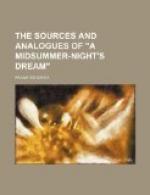A new adventure him betides;
He met an Ant, which he bestrides,
And post thereon away he rides,
Which with his
haste doth stumble,
And came full over on her snout;
Her heels so threw the dirt about,
For she by no means could get out,
But over him doth
tumble.
And being in this piteous case,
And all be-slurried head and face,
On runs he in this wild-goose chase,
As here and there
he rambles;
Half blind, against a molehill hit,
And for a mountain taking it,
For all he was out of his wit
Yet to the top
he scrambles.
And being gotten to the top,
Yet there himself he could not stop,
But down on th’ other side doth
chop,
And to the foot
came rumbling;
So that the grubs, therein that bred,
Hearing such turmoil overhead,
Thought surely they had all been dead;
So fearful was
the jumbling.
And falling down into a lake,
Which him up to the neck doth take.
His fury somewhat it doth slake;
He calleth for
a ferry;
Where you may some recovery note,
What was his club he made his boat,
And in his oaken cup doth float,
As safe as in
a wherry.
Men talk of the adventures strange
Of Don Quishott, and of their change,
Through which he armed oft did range,
Of Sancha Pancha’s
travel;
But should a man tell everything
Done by this frantic Fairy King,
And them in lofty numbers sing,
It well his wits
might gravel.
Scarce set on shore, but therewithal
He meeteth Puck, which most men call
Hobgoblin, and on him doth fall
With
words from frenzy spoken:
“Ho, ho,"[7] quoth Hob, “God
save thy grace!
Who drest thee in this piteous case?
He thus that spoiled my sovereign’s
face,
I would his neck
were broken!”
This Puck seems but a dreaming dolt,
Still walking like a ragged colt,
And oft out of a bush doth bolt,
Of purpose to
deceive us;
And leading us makes us to stray,
Long winter’s nights, out of the
way;
And when we stick in mire and clay,
Hob doth with
laughter leave us.
“Dear Puck,” quoth he, “my
wife is gone:
As e’er thou lov’st King Oberon,
Let everything but this alone,
With vengeance
and pursue her;
Bring her to me alive or dead,
Or that vild[8] thief Pigwiggen’s
head;
That villain hath defiled my bed,
He to this folly
drew her.”
Quoth Puck, “My liege, I’ll
never lin[9],
But I will thorough thick and thin,
Until at length I bring her in;
My dearest lord,
ne’er doubt it.
Thorough brake, thorough briar,
Thorough muck, thorough mire,
Thorough water, thorough fire;
And thus goes
Puck about it.”




